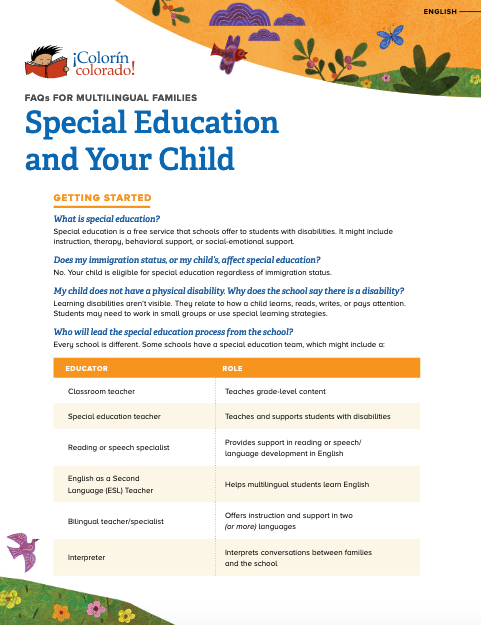Getting started
What is special education?
Special education is a free service that schools offer to students with disabilities. It might include instruction, therapy, behavior support, or social-emotional support.
Does my immigration status, or my child’s, affect special education?
No. Your child is eligible for special education regardless of immigration status.
My child does not have a physical disability. Why does the school say there is a disability?
Learning disabilities aren’t visible. They relate to how a child learns, reads, writes, or pays attention. Students may need to work in small groups or use special learning strategies.
Who will lead the special education process from the school?
Every school is different. Some schools have a special education team, which might include:
| Educator | Role |
| Classroom teacher | Teaches grade-level content |
| Special education teacher | Teaches and supports students with disabilities |
| Reading or speech specialist | Provides support in reading or speech/language |
| ESL (English as a Second Language) teacher | Helps multilingual students learn English |
| Bilingual teacher/specialist | Offers instruction and support in two (or more) languages |
| Interpreter | Interprets conversations between families and the school |
What is an Individualized Education Plan (IEP)?
An IEP is a program the school and family create together. It explains:
- how your child is doing currently, including your child’s strengths
- goals for your child
- a plan to reach those goals, such as services and accommodations for the classroom
- who will provide this support (and when)
- your child’s progress over time.
The school will schedule IEP meetings to create this plan. You have the right to:
- help inform your child’s IEP
- attend every IEP meeting
- hear your rights before every meeting
- reschedule IEP meetings
- receive all updates
- review or change the IEP
- ask questions any time.
Can my child exit special education services?
Yes. Remember that special education services can help students work more independently. IEP meetings are a good time to share your questions and concerns.
My child is struggling in school. Can I request special education services?
You can ask the school to evaluate your child. The school may or may not recommend special education services or other supports. Ask your child’s teachers about your options at any time.
My role
What is my role in this process?
U.S. schools want families to partner with their child’s school! You know your child best. Share ideas about your child’s, interests, personality, and behavior. Ask for ideas and help if needed.
I don't agree with the school’s plan. What should I do?
You have the right to refuse, change, or stop special education services. However, it is important to understand the school’s recommendations before you make a decision.
Language
How do I get information in my own language?
You have a right to:
- receive ALL information in your language
- have an interpreter during any conversation or meeting.
What if my child needs both ESL and special education services?
Your child has a legal right to receive ESL, bilingual/ dual language, AND special education services. It is the school's responsibility to offer ALL services your child needs. My child is still learning English.
How can we be sure my child needs special education?
It can be difficult to know if a child who is learning a new language needs special education. That’s why it’s very important to have professionals who speak your language on the team, if possible. They can evaluate your child in your language. This gives them a better picture of your child's learning. If your child struggles in your language, please let the team know.
Multilingual Tip Sheets
See these tips in the following languages:
Acknowledgements
 This resource was created thanks to generous support from the National Education Association.
This resource was created thanks to generous support from the National Education Association.









Add new comment